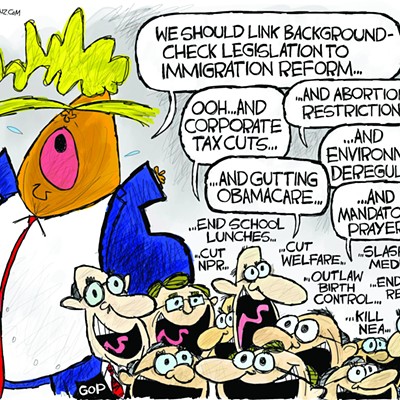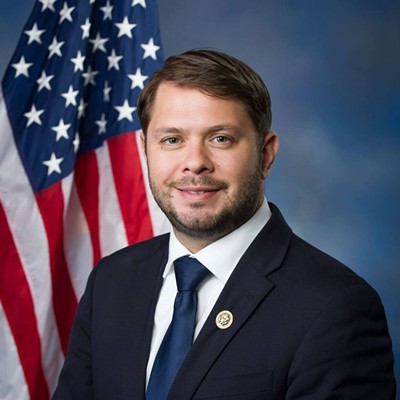"It's a farce," declares one of these lawbreakers, who thinks the lack of pressure on American drug companies to lower costs is unbelievable. "The fact the federal government didn't make any effort to lean on the drug companies for better prices is so silly, it boggles the mind."
This man, who has been buying drugs from Canada for several years (See "Illegal Drugs," March 27, 2003), is about to cease doing so. Even though he labels the Medicare benefit process "confusing" and "bizarre," and does not want to spend hours studying all of the available alternatives, he has enrolled in one of the most popular drug-insurance plans among the more than 40 being offered.
"It covers everything I take at the same prices," he says of the plan he chose, "and what I buy in Canada won't count against the deductible." So he is switching tactics to obtain his costly medications.
This Tucson senior realizes, though, that he may soon have to resume purchasing at least some items from north of the border. Under the Medicare plan, if he exceeds $2,250 in total drug costs, he enters the infamous "gap" phase of the program, which provides no coverage.
Once in this spending limbo, senior drug purchasers must pay 100 percent of their medication expenses until $5,100 is reached. If he reaches the "gap," Canada might offer a lower-cost option.
Another Tucsonan who has been receiving periodic medications from New Zealand will also stop importing them. The insurance plan he has selected offers the drugs at the same price, so he will purchase them locally.
Other people, however, believe they can still save money by shopping for drugs online. Stewart Grabel, ombudsman for the Pima Council on Aging, remembers one senior told him he would buy drugs from Canada since the Medicare plan was more expensive. Grabel has additionally heard the price of prescription medications in Mexico has gone up, which also may influence what people do.
Just before Christmas, Grabel pointed out some hard realities of the new benefit plan. "We're dealing with a program that does not exist yet," he said, "and prices are literally all over the place. At this point, they're estimates only, plus the government has no way of controlling the prices."
Having participated in numerous seminars on the subject, and with his agency fielding more than 100 calls a day on the program, Grabel is outspoken in his opinion.
"Trust the government," is what people are told, Grabel says sarcastically. "Trust what the computer spits out. But this is a new program, and nobody knows what it will do. It's been made as complicated as possible. The implications for seniors and the way the act was put together are just horrendous."
As a result, confusion about what to do reigns among older Americans. Less than 3 percent of the 42 million eligible seniors had actually signed up for the benefit by Jan. 1, while 20 million other people were automatically enrolled in the program.
This lack of understanding wasn't unexpected. The results of a survey done for the Kaiser Family Foundation, which were released in November, indicated major problems with older people comprehending the program.
"Many seniors remain uncertain about how the law will affect them and unsure about whether they will enroll," a press release from the nonprofit, private foundation stated. "The results highlight the critical importance of ongoing education efforts to successful implementation of the new program."
A small sample of Tucson seniors also showed they were uncertain about what to do; all have decided to just stick with their existing insurance plans. While interested in knowing about other choices, they had either received too little or too much information to make a final decision.
Already having existing drug coverage, Jerry Juliani is waiting to hear from his HMO about what his options may be. "I've received nothing from them," he says in frustration. "I've thought about calling them to try and get more information, but I don't know who to call."
"I don't know what I'll do," Barbara Kittle said. "I have a plan now, but I might switch. I'm a little bit confused. I keep getting promotional stuff from everybody."
Along with other older Americans, these seniors have until May 15 to make up their minds. After that date, they may be assessed a penalty, and also won't be able to enroll again until Nov. 15.
For his part, one of the seniors who illegally purchases drugs from outside the country, but is now changing strategies, is amazed at how confusing the whole process was made.
"It's such a mess, you wouldn't believe it," this professional businessman says. "I spent hours and hours with a certified public accountant studying it. It's so complicated. I feel sorry for the elderly who can't cope with this. They'll be lost."
This Tucsonan knows who he blames for this sorry situation. "It's the drug industry and the Republicans," he charges.












